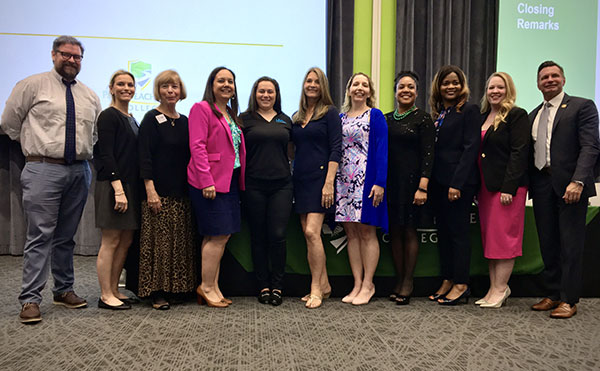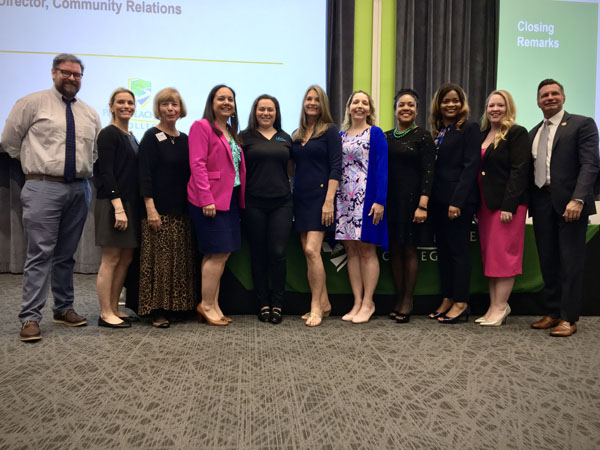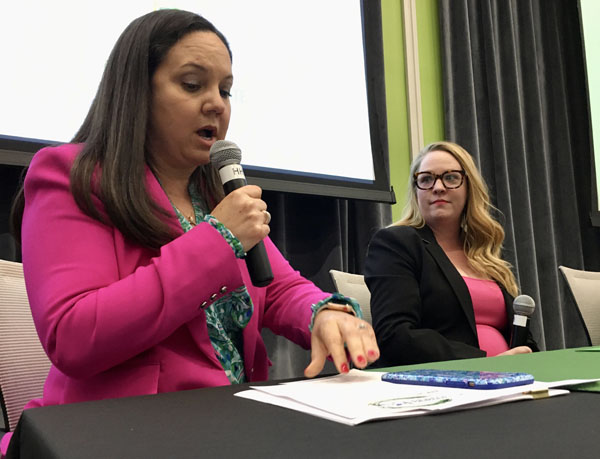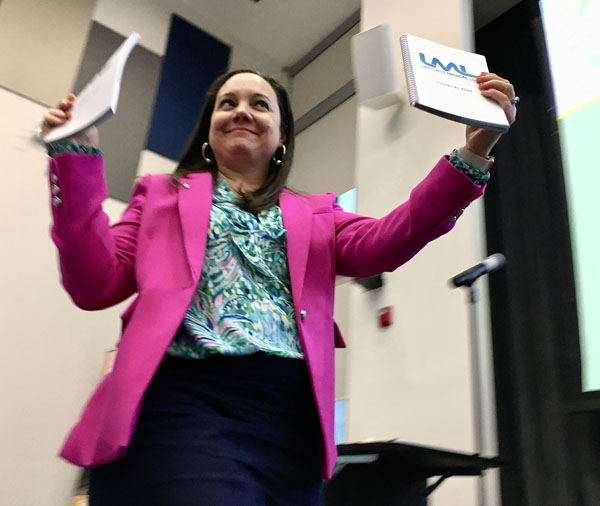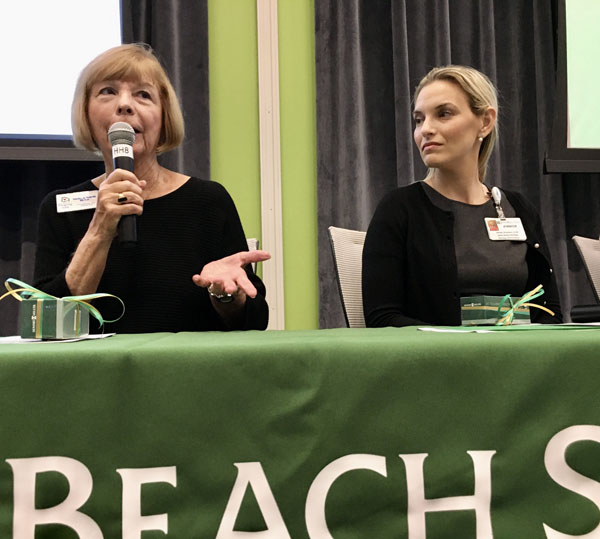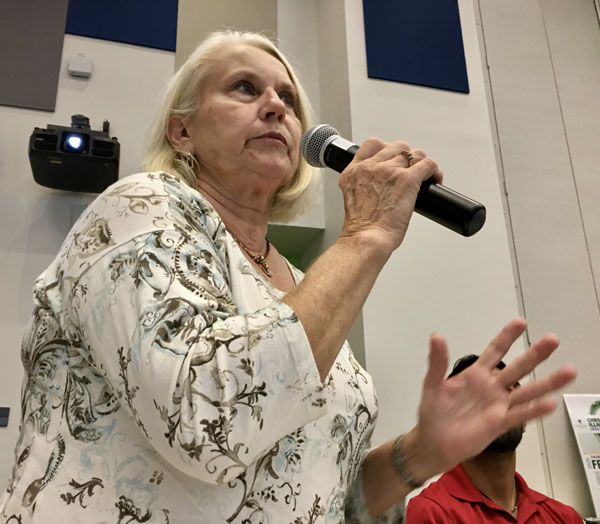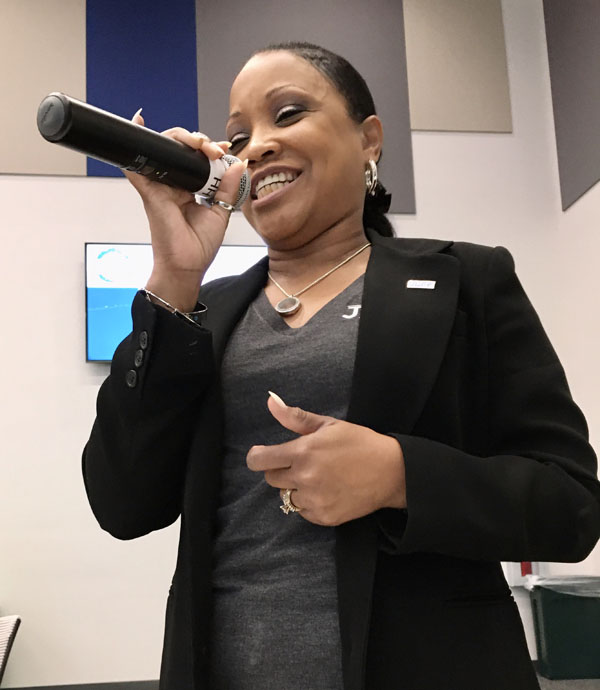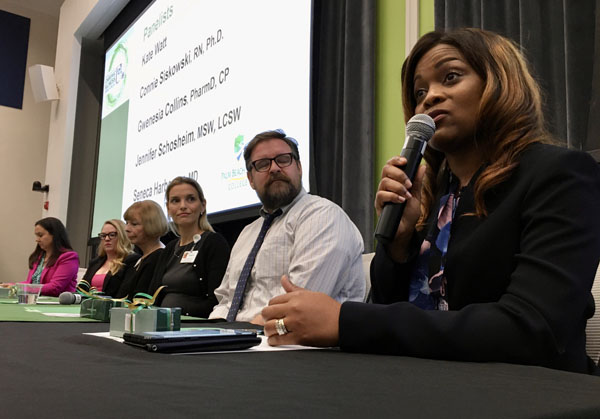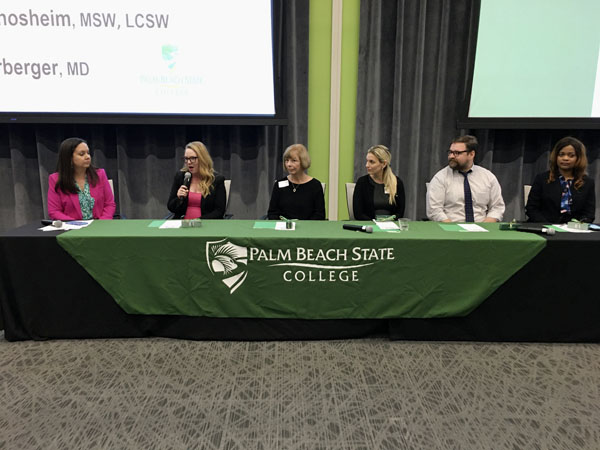Five panelists engaged in an informative discussion on health and wellness Thursday, Feb. 20 when Palm Beach State College hosted a Chronic Illness Forum at its Loxahatchee Groves campus.
A diverse crowd gathered in the campus lecture hall for an event moderated by Michelle McGovern, Baptist Health South Florida’s director of government and community relations, with special presentations by Jordan Ray, the CEO and president of Limitless Medical Logs, and Melissa Santoro on behalf of State Rep. Matt Willhite.
The panelists included Kate Watt, executive director of Susan G. Komen Florida; Dr. Connie Siskowski, president of the American Association of Caregiving Youth; clinical social worker Jennifer Schosheim; family medicine physician Dr. Seneca Harberger; and Dr. Gwenesia Collins, the assistant vice president of Boca Raton Regional Hospital, a Baptist Health South Florida facility.
While chronic illness was the headline topic, the speakers also touched on related issues, such as caregiving and stress.
“This event was created to provide resources and guidance to people like myself, battling chronic illnesses,” said keynote speaker Jordan Ray, who was a prospective college softball player until being faced with a devastating diagnosis.
“I was running for a routine play at third base when I unexpectedly blacked out on the softball field,” Ray recalled. “When I got up a few seconds later to my teammates and my coaches around me asking if I was OK, obviously — I was an athlete — I lied to them. I said, ‘I’m fine. Keep me in the game.’ But I knew something was really wrong.”
After months of consecutive migraines and extreme pain, Ray found herself in a neurosurgical consultation.
“He was drilling me with questions regarding my healthcare, and I was not able to tell him anything,” Ray said. “I just couldn’t remember how I was yesterday, much less last week or even last month because of how much pain I was in, and how much stress dealing with something like this was.”
After a series of tests, Ray followed up a few months later, learning that she has Chiari malformation, a neurological disorder where the cerebellum extends into the spinal canal blocking cerebral spinal fluid to and from the brain.
Ray learned that a 10-hour brain surgery followed by five days in the ICU and an extensive recovery were her next steps.
“My medical team and my physical therapist were always asking me how I was doing, how was I last week, how was I the following month, and I just could not remember how I was,” Ray said. “I felt so out of control of my own health, and I knew others were experiencing the same thing. My mom went into remission for breast cancer when I was 16, a month before I blacked out on the softball field. I saw her struggling at all of her appointments, as well.”
Ray had an idea: What if there was an all-in-one medical log for patients to accurately track pain symptoms?
At 20 years old, Ray launched Limitless Medical Logs two years ago in order to help patients with just that issue.
“So, when you go back to your doctor, you’ve now eliminated the guessing game between you as a patient, the caregiver and also the physician,” Ray said.
According to the young entrepreneur, her symptoms range from three to six debilitating migraines per week, extreme neck and back pain, tingling and numbness throughout her body, and memory loss.
Despite it all, Ray chooses not to focus on the negative. “How I think of it now is, I was given the opportunity to play the sport I love for 13 years and use it as my foundation for my unexpected future,” she said.
Likewise, the panelists stressed the importance of a positive environment both when dealing with a chronic illness or caring for someone who is.
According to the professionals, chronic illness is commonly accompanied by stress, and it’s important for patients and caretakers to know they’re not alone in the fight.
“It’s hard, and it’s tireless work to be an advocate for your own health, and at some point, it’s always something that you just can’t imagine doing anymore,” Susan G. Komen’s Kate Watt said. “And that’s where we hope we come in. That’s where we can come in with the support and be there and, hopefully, take on a little bit of that stress to help the patient be able to manage that.”
For this reason, Watt said, the organization offers survivorship programs to patients in need. Watt herself lost her aunt to cancer, and her mother is a cancer survivor.
“I’ve never had anyone who has the same journey,” Watt said. “But we can rely on each other, and so that is the role that Komen plays.”
According to Jennifer Schosheim — a full-time clinical social worker at Jupiter Medical Center who runs support groups in Palm Beach County — caregiver support is extensively beneficial.
“I’m so happy that there are so many people here who talk about caregivers, because it’s a population that is not focused on in the national/international view, because we focus on the person dealing with the illness, and often not on the caregiver,” Schosheim said. “And the caregiver is dealing with a lot of the similar feelings and experiences that the patient is, but they’re not asked how they’re doing.”
Schosheim said she has personally seen the inter-caregiver bond that can form between individuals with similar struggles, even if their loved ones aren’t facing the exact same illness. “When you really get down to it, the emotions are just so similar, and the experiences are so similar, people don’t feel alone,” she said.
As much as adults need community support in times of trouble, Dr. Connie Siskowski of the American Association of Caregiving Youth said that children are no different.
“I work with the school district. We do skills groups, and it’s often there that they get to know that maybe even the child across the street from them is dealing with some of the same issues, and so they learn that they’re not alone,” Siskowski said.
An overarching theme throughout the evening was encouragement for those dealing with chronic illness in any way, shape or form to reach out to the appropriate organizations for support through their battle.


